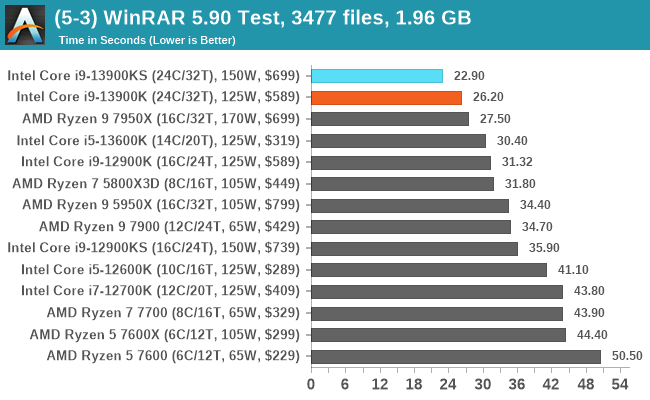The Intel Core i9-13900KS Review: Taking Intel's Raptor Lake to 6 GHz
by Gavin Bonshor on January 27, 2023 10:00 AM ESTCPU Benchmark Performance: Rendering And Encoding
Rendering tests, compared to others, are often a little more simple to digest and automate. All the tests put out some sort of score or time, usually in an obtainable way that makes it fairly easy to extract. These tests are some of the most strenuous in our list, due to the highly threaded nature of rendering and ray-tracing, and can draw a lot of power.
If a system is not properly configured to deal with the thermal requirements of the processor, the rendering benchmarks are where it would show most easily as the frequency drops over a sustained period of time. Most benchmarks in this case are re-run several times, and the key to this is having an appropriate idle/wait time between benchmarks to allow for temperatures to normalize from the last test.
One of the interesting elements of modern processors is encoding performance. This covers two main areas: encryption/decryption for secure data transfer, and video transcoding from one video format to another.
In the encrypt/decrypt scenario, how data is transferred and by what mechanism is pertinent to on-the-fly encryption of sensitive data - a process by which more modern devices are leaning to for software security.
We are using DDR5 memory on the 12th and 13th Gen Core parts, as well as the Ryzen 7000 series, at the following settings:
- DDR5-5600B CL46 - Intel 13th Gen
- DDR5-5200 CL44 - Ryzen 7000
- DDR5-4800 (B) CL40 - Intel 12th Gen
All other CPUs such as Ryzen 5000 and 3000 were tested at the relevant JEDEC settings as per the processor's individual memory support with DDR4.
Rendering










Both the Core i9-13900KS and Core i9-13900K trade blows regarding rendering performance. In some instances, such as POV-Ray, it seems that the slight thermal throttling of the 13900KS did hinder things here a little, but in Cinebench R23, the Core i9-13900KS shone in the single-threaded test.
Encoding






When it comes to encoding, the Core i9-13900KS takes away as many wins as it does losses against the Core i9-13900K. The Core i9-13900KS does take a big win in our WinRar 5.90 benchmark by a solid 3.3 seconds.










39 Comments
View All Comments
erinadreno - Friday, January 27, 2023 - link
No.nandnandnand - Friday, January 27, 2023 - link
Practically useless, even at 720p. Looking forward to 7000X3D.Kangal - Friday, January 27, 2023 - link
Sure, the i9-13900KS can be seen as "the best"......but it's hard to justify it for the real-world when there's the Intel Core i5-13600k right there! You're paying half the amount and using less power, to achieve a very impressive score right up there with the best.
I guess even more impressive is the AMD r7-7700 which trades blows with that chipset in performance, competitively price, uses significantly less power, and most importantly has a long support (AM5) period.
I wish we continue to see this trend, with the luxury products making it clear to show how good the mid-high range products have become. In some parts this is a correction in the market due to new competition. Consumers rejoice!
Andresen - Friday, January 27, 2023 - link
A very expensive and fast cpu is testet with some very slow memory. I don’t see the point in doing that. The slowest memory rated as DDR5-5600 in my local webshop is CL40 and the most commen is CL36 and I could choose CL28. CL46 is not an option. I’m not in the market for this cpu, but if I were I would combine it with DDR5-7200 at CL32. If memory overclocking is not an option, then I would use DDR5-5600 CL36.Makaveli - Friday, January 27, 2023 - link
Have to agree with you on this. No one buying this CPU is going to be pairing with the DDR5-5600 memory.Andresen - Monday, January 30, 2023 - link
I forgot to add, that apart from my minor critics regarding choice of memory, that it is nice that AnandTech makes these thorough reviews. I don’t think I can find such quality reviews anywhere else for pc-class hardware.Great_Scott - Wednesday, February 1, 2023 - link
The reviews are great, although I can't imagine there's a single hand-built Ryzen PC in existence that's using memory at JEDEC timings.It was interesting to see how the Ryzen 7950X was able to keep up in a large number of tests.
GeorgeV - Saturday, February 11, 2023 - link
Honestly, I wish these high end CPUs were tested at the speeds they can run 128GB of RAM at. From what I've seen around the web, these tested RAM speeds are higher than either can manage reliably when all 4 dimms are filled.jospoortvliet - Monday, February 13, 2023 - link
Well Andresen thinks it should be faster you think slower. I guess they did it right?DanNeely - Friday, January 27, 2023 - link
"*We changed the motherboard to the GIGABYTE Z690 Aorus Master as the MSI MPG Z790 Carbon WIFI we used for our previous 13th Gen Core series reviews refused to play ball. We don't like to make these changes lightly, but we weren't able to source another Carbon in time for this review"Did it fail outright, or still work for other chips but choke on this extra-power hungry one?